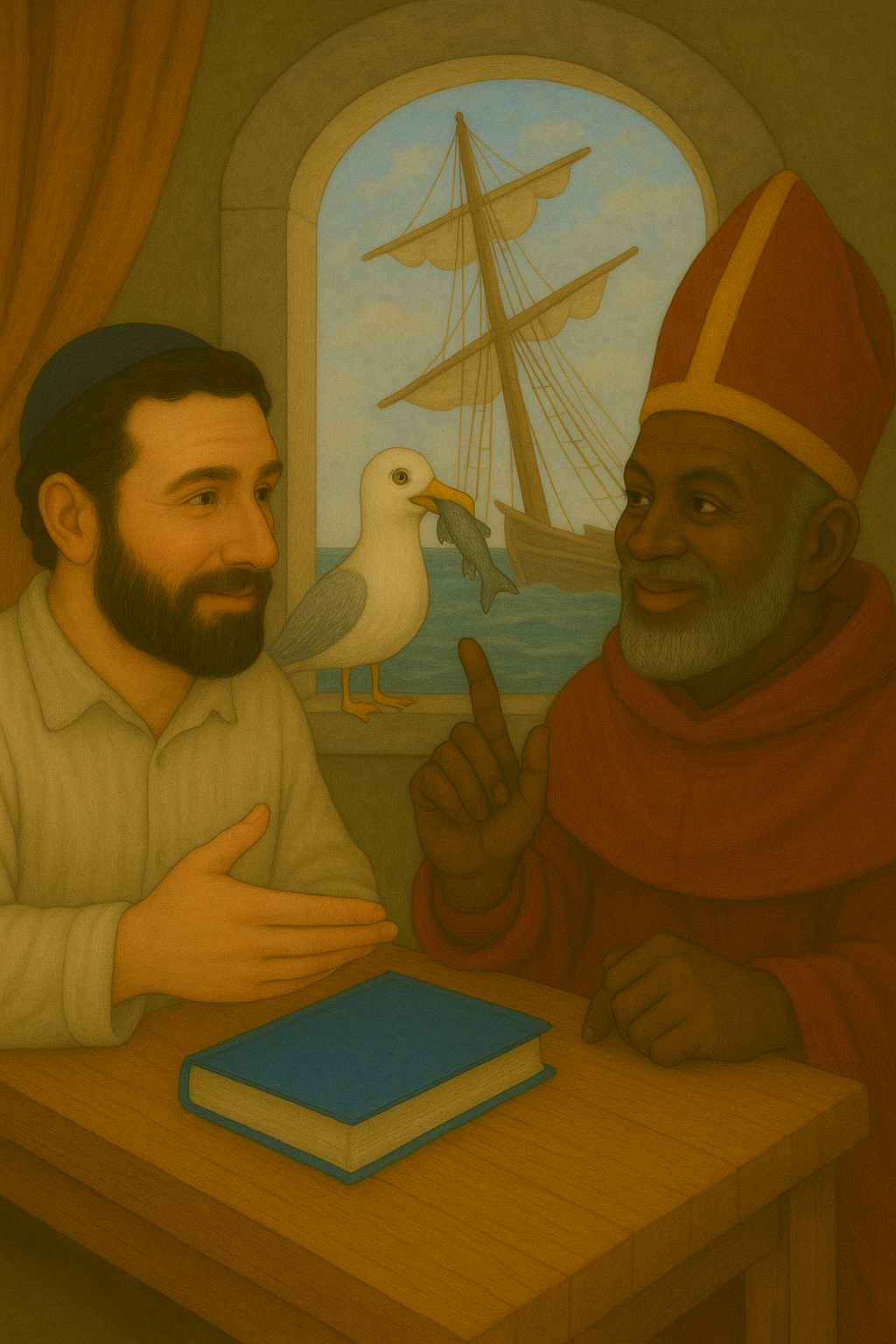
Isaac and the Bishop of Cartagena (1826)
Notes of López Penha
Moseh de Daniel López Penha (1784 - 1854) wrote a family history in 1826. In this document he detailed the lives of his many uncles. One inscription was about his uncle Isaac who was born 277 years ago in Amsterdam in the twelfth month of 5508 of the Hebrew calendar. The uncle sailed to Curaçao when he was 21 and was shipwrecked on the shores of Cartagena, Colombia.
This is a true story of his uncle’s friendship with the local bishop.
Lopez Penha’s Manuscript is reproduced by kind permission of David Serphos, a descendant of the family.
Isaac and the Bishop of Cartagena (1826)
A long time ago, a Jewish man named Isaac sailed across the Atlantic sea, carrying only a small leather-bound book and his dreams of a new home. He had traveled far—from the bustling city of Amsterdam to the warmth of the Caribbean, where he hoped to start a family with his beloved wife, Ribca. She was expecting their first child, and Isaac promised her they would land on the island of Curaçao before the little one arrived.
But the sea had its own plans.
One evening, a storm as fierce as a roaring beast rose up from the ocean. The waves crashed and howled, tossing their ship like a leaf in the wind. The storm raged for hours. Isaac held up his wife over the waves. And his wife held up Isaac’s small leather-bound book.
When it was over, Isaac and Ribca found themselves washed on the shore outside a city called Cartagena off the coast of Colombia. When Isaac opened his eyes, he saw a towering figure in a red robe. It was the Bishop of Cartagena, a man who ruled over the land.
For seven days and seven nights, Isaac and Ribca rested beneath the Bishop's roof. The Bishop spent those days reading Isaac’s small book, his eyes growing wide with wonder as he discovered the wisdom it contained.
Finally, the Bishop spoke.
“I have read your book,” he said. “It speaks of the Great Spark of Creation, of kindness and justice, of the ways of a good man. Join my faith, Isaac, and I will make you governor of this land.”
Isaac smiled and shook his head. “I cannot,” he replied. “We are on our way to our family in Curaçao.”
The Bishop's eyes narrowed, and a smile flickered across his face. "Then let me ask you one question to see whose wisdom is greater," he said. "If you answer well, you may go free. But if you fail, you will stay here and serve the church."
The Bishop leaned forward. “You wish for freedom. What is freedom?”
“That question has a clear answer,” replied Isaac. “Freedom,” he looked at the sea through the window behind the bishop, “is the ability to walk one’s own path.”
The Bishop frowned, pondering Isaac’s words. “But is not safety a kind of freedom? Is not life without worry a freedom? We can offer you that here in Cartagena”
Isaac smiled, “It may seem that way, but that’s not real freedom. True freedom comes from within. It’s about being able to make your own choices, to follow your heart, and to stay true to your promises. No one can give you that kind of freedom—it is a gift you give yourself.”
The Bishop was silent for a long time. Then he sighed. “You are right,” he said softly. “Freedom is not something I can grant you. It is already yours.”
With that, the Bishop nodded and admitted defeat. “You have bested me, Isaac,” he said with a smile. “I cannot keep a man who walks with such wisdom.”
That evening, beneath a full moon, the Bishop led Isaac and his wife to a Dutch ship sailing back to Curaçao. Before they parted, he handed Isaac the leather-bound book together with a present of three books from his personal library.
As Isaac and Ribca sailed across the sea once more, the waters were calm, and they held each other close. Just days before they reached their island home, Ribca gave birth to a beautiful baby girl. “You are our light,” Isaac whispered, naming her Herut after the word freedom.
Yet life is often bittersweet. Ribca, too weak from the journey, passed away shortly after the birth. Isaac’s heart was heavy with sorrow, but he wrapped her in a sail and promised her a peaceful farewell once they reached Curaçao.
True to his word, Isaac united with his family in Curaçao, laid Ribca to rest in the Beth Haim cemetery, the sacred resting place of their ancestors in Willemstad alongside Ribca Spinoza, half-sister of Baruch Spinoza who died in 1695. Jahacob Alvares Carrea, an assistant of Malag-born Eliau Lopez, the Chief Rabbi of Curaçao who died in 1714.
And then in 1826, 57 years after Isaac was shipwrecked off the coast of Cartagena, his nephew, Moseh de Daniel López Penha wrote about his adventures.
Music
That Bumped the Walls




